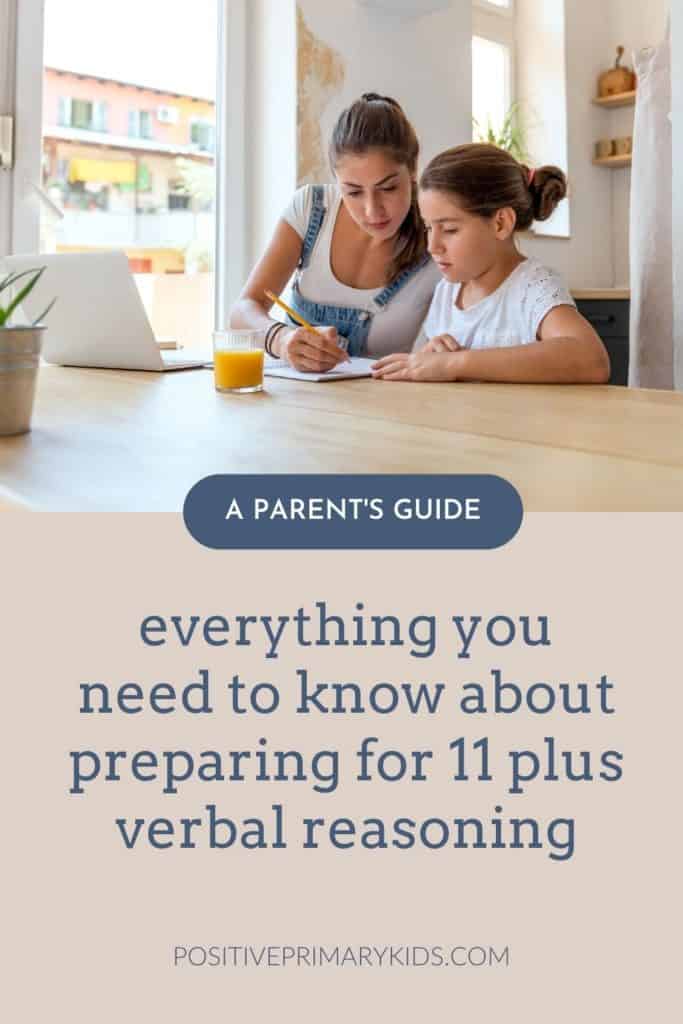How can it be April already? This school year is absolutely flying by!
Most grammar schools open their registration for the 11 plus exams at the end of the month or the start of May. If your child is currently in year 5 and you are considering applying to grammar schools, now is the time to begin to really focus on exam preparation.
The theme of this month’s education posts is specifically the verbal reasoning part of the 11 plus. This theme follows my recent series of articles about choosing the right secondary school and understanding what the 11 plus exams entail.
Note: This article is specifically about the GL verbal reasoning test since that is the exam board that I tutor children for.
Affiliate Disclosure: This post may contain affiliate links. This means that I may receive a small commision – at no cost to you – if you make a purchase through these links. Thank you for your support!
What is verbal reasoning?
The first time kids encounter verbal reasoning is likely to be if they are preparing for the 11 plus. It isn’t part of the primary curriculum so it can cause children and parents alike some anxiety – but there’s no need to worry! The children that I tutor typically really enjoy verbal reasoning work and find it lots of fun!
Verbal reasoning tests are designed to test skills rather than knowledge. This makes them a popular choice for grammar schools to include in their entrance exams because results show children’s academic potential, rather than their ability to memorise or regurgitate knowledge.
As its name suggests, ‘verbal’ reasoning involves using word knowledge and language skills to process information, follow instructions, think critically and work logically to solve problems.
If some of the things I talk about in this post are unfamiliar to you, it may help to go back and read these related articles all about choosing a secondary school:
Is verbal reasoning maths or English?
This is a question that I often get asked by my students’ parents and can be a bit confusing.
11 plus verbal reasoning is based on vocabulary, spelling and being able to reason with words. Where it confuses people is that despite mainly drawing on language skills, some verbal reasoning questions use maths concepts such as simple algebra, number sequences and solving codes. These types of questions are included because they use the same reasoning skills as the more obviously language-based questions.

What skills and knowledge are most important for verbal reasoning success?
First and foremost, children need a very broad vocabulary. I cannot emphasise this enough! Without a sophisticated vocabulary, verbal reasoning tests can be very challenging. Enthusiastic readers who read widely from different genres tend to have much larger vocabularies than reluctant readers.
Here are some examples of potential words that could crop up:
- adhere
- insolent
- lament
- destitute
- latter
- endeavour
See what I mean? Not exactly the type of vocabulary that the average 10 or 11-year-old uses daily!
Children are expected to understand, use, spell and define vocabulary as well as know their synonyms, antonyms and homonyms (words with the same meanings, opposite meanings and same spelling or pronunciation but different meanings respectively).
As well as having excellent vocabulary and spelling, children need to be able to:
- Work quickly
- Work accurately
- Be familiar with each question type
- Have a strategy for answering each question type logically
- Have solid basic maths skills such as knowledge of special numbers (square numbers, factors, prime numbers, etc.)
- Have good general knowledge
What sort of questions are in 11 plus verbal reasoning?
There are around 21 types of questions that are used in the exam although a couple of these types have some variations. Familiarising children with each question type is necessary. Different educational publications group the question types in different ways. I group them as follows:
- Word meanings
- Making and finding words
- Maths and sequences
- Codes
- Reading information and logic
If you want to dive deeper into each topic, read my article about 5 verbal reasoning questions types. In it, each group of questions is explained along with examples so that you can get a feel of the full range.
How do you teach verbal reasoning for the 11 plus?
Although, as I mentioned earlier, children aren’t taught verbal reasoning skills at school, they will need to draw on their language knowledge to do well. Encourage them to read plenty of good quality books – I know that this can be a battle, but an understanding of language and vocabulary is essential for success.
I know from my early days as an 11 plus tutor that at first glance, children who are unfamiliar with verbal reasoning tend to see the questions and straight away assume that they can’t do it because they’ve never seen it before. It’s understandable. Without ever experiencing the subject before these questions can be confusing.
For that reason, it’s crucial to spend time working on each question type and get plenty of practice before the exam. They need to learn the strategies and techniques to solve questions logically and at speed.
Next steps
There is usually a considerable amount of work to do in order to prepare children for 11 plus exams, so please don’t leave it to the last minute! You can read my 11 Plus Verbal Reasoning Test Preparation Guide For Parents post for a much more detailed look at the preparation process and learn about 25 common mistakes parents make so that you can avoid them!
The big decision that you will need to make is if you will hire a tutor or take the DIY route.
If you choose to do it yourself, there are plenty of 11 plus books available to help you as well as online resources. On the other hand, working with a tutor, tuition centre or course provider takes a lot of the pressure off you. There are pros and cons to both routes and each family’s needs and circumstances are completely different.
If you want to hire a tutor, I can help! Get in touch with me to arrange a free 30-minute consultation so that we can discuss your needs. Click the button below to book.
Finally, don’t forget to take a look at the next post in this series for a more detailed look at all of the question types that come up in GL 11 plus verbal reasoning exams along with some examples.
Are you considering 11+ tutoring for your child?
Book a free 30-minute relaxed, informal chat with me at a time that suits you. We’ll talk about your child’s needs and learning goals as well as any concerns you have. If we are a good fit for each other, we can discuss the next steps for getting started.
Tuition is subject to availability. Calls are either by phone or Zoom.







0 Comments